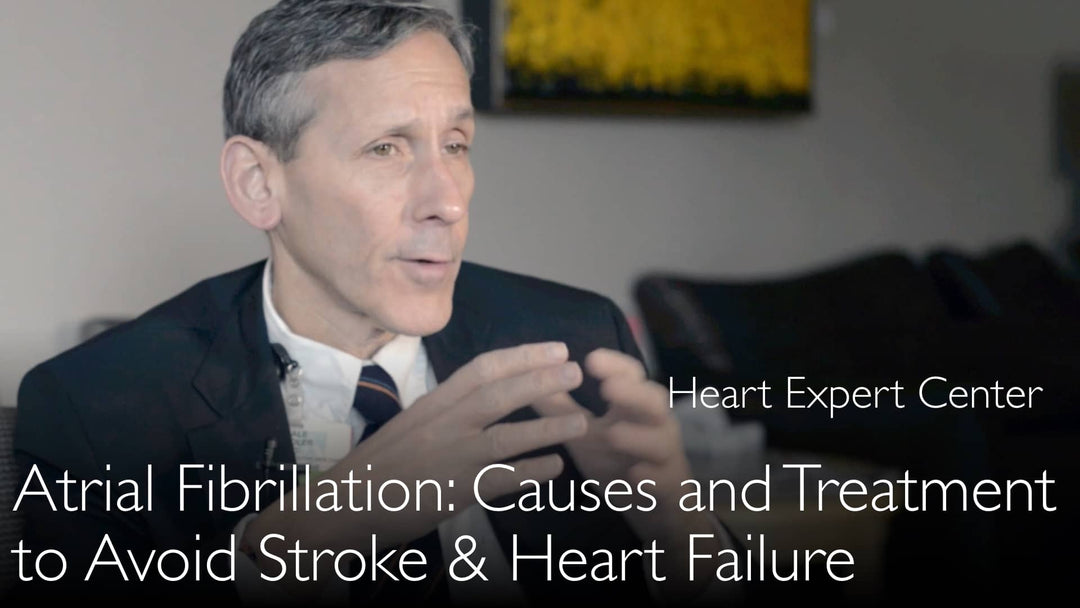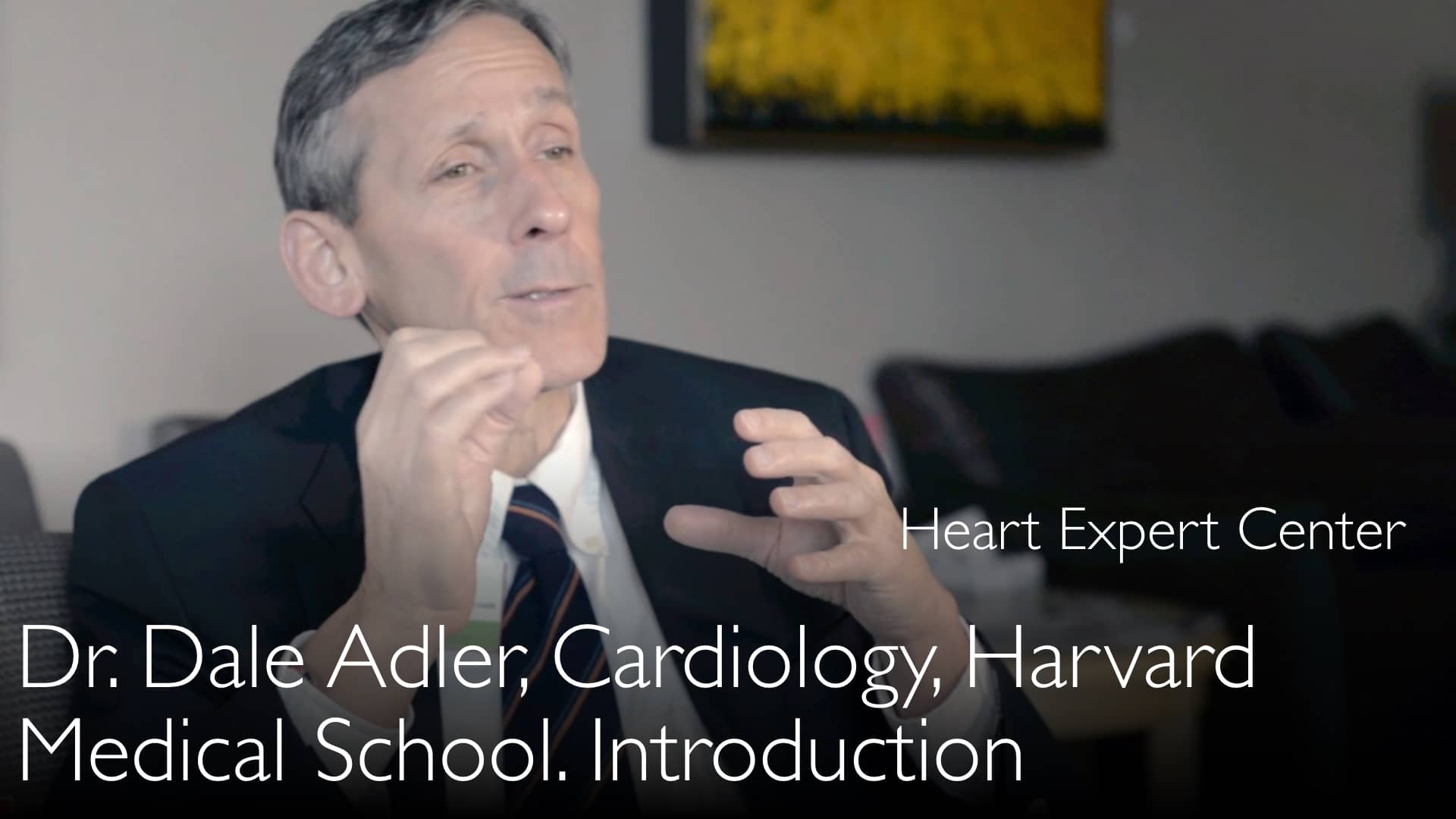Atrial fibrillation (AFib) is a common cardiac arrhythmia characterized by irregular and often rapid heart rate. Dr. Dale Adler, MD, a leading expert in cardiology, discusses the causes, risk factors, and treatment strategies for atrial fibrillation. Key risk factors include hypertension, thyroid dysfunction, diabetes, and heart failure. Age is a significant factor, with prevalence increasing in older populations. Understanding the triggers and substrates of AFib is crucial for effective management. Treatment often involves anticoagulants like warfarin to prevent stroke, but these medications carry bleeding risks. A comprehensive approach, including second opinions, ensures accurate diagnosis and optimal treatment.
Understanding Causes and Risk Factors of Atrial Fibrillation
Jump To Section
- Causes of Atrial Fibrillation
- Key Risk Factors for AFib
- Triggers and Substrates in AFib
- Effective Treatment Strategies for AFib
- Risks of Anticoagulation Therapy
- Preventive Measures for Atrial Fibrillation
- Full Transcript
Causes of Atrial Fibrillation
Atrial fibrillation arises from irregular electrical impulses in the heart's upper chambers. Dr. Dale Adler, MD, explains that these impulses disrupt normal heart rhythm, leading to AFib. Common causes include heart surgery, thoracic surgery, and conditions that alter heart geometry or electrical signaling.
Key Risk Factors for AFib
Dr. Dale Adler, MD, highlights several risk factors for atrial fibrillation. Hypertension, thyroid dysfunction, diabetes, and heart failure significantly increase AFib risk. Age is also a critical factor, with 4% of individuals over 60 and 15% over 80 experiencing AFib. Heart valve issues and pericardial inflammation further contribute to risk.
Triggers and Substrates in AFib
Understanding triggers and substrates is essential for managing AFib. Dr. Dale Adler, MD, describes triggers as additional electrical impulses affecting the left atrium, while substrates refer to the heart's inability to manage these impulses. Surgery, hypertension, and lung issues can create these conditions, leading to sustained AFib.
Effective Treatment Strategies for AFib
Treatment for atrial fibrillation often involves anticoagulants like warfarin to prevent stroke. Dr. Dale Adler, MD, emphasizes the importance of a second opinion to ensure accurate diagnosis and optimal treatment. Managing risk factors and understanding individual patient needs are crucial for effective AFib management.
Risks of Anticoagulation Therapy
While anticoagulants reduce stroke risk in AFib patients, they also carry bleeding risks. Dr. Dale Adler, MD, notes that bleeding can occur in the gastrointestinal tract, under the skin, or in the brain. Careful monitoring and individualized treatment plans are necessary to balance these risks.
Preventive Measures for Atrial Fibrillation
Preventing atrial fibrillation involves managing risk factors such as hypertension and diabetes. Dr. Dale Adler, MD, advises regular monitoring and lifestyle changes to reduce AFib risk. Early intervention and comprehensive care can significantly improve patient outcomes.
Full Transcript
Dr. Anton Titov, MD: Why does atrial fibrillation happen? What are the risk factors for atrial fibrillation? What can trigger atrial fibrillation? What is paroxysmal atrial fibrillation?
Dr. Anton Titov, MD: Hypertension is a risk factor. Thyroid dysfunction is a risk factor for atrial fibrillation. Heart geometry changes ("substrate") and electrical signal changes ("trigger") lead to cardiac arrhythmia. Diabetes and metabolic syndrome are big risk factors for AFib. Heart failure increases the risk of atrial fibrillation. Older age increases the probability of developing atrial fibrillation.
Dr. Anton Titov, MD: How do we treat atrial fibrillation today? A second opinion ensures that the diagnosis of atrial fibrillation is correct and complete. A second opinion also helps to choose the best treatment strategy for atrial fibrillation. Seek a second opinion on atrial fibrillation and be confident that your treatment is the best.
Dr. Dale Adler, MD: You are just correct. Atrial fibrillation is a growing problem. Atrial fibrillation frequency is age-related. We know that 4% of patients older than 60 years of age have atrial fibrillation. 15% of patients older than 80 years of age have atrial fibrillation. The increase in atrial fibrillation with age makes sense because atrial fibrillation occurs when there are "triggers" on top of the "substrate".
Dr. Dale Adler, MD: What do we mean by atrial fibrillation triggers? Triggers in atrial fibrillation are additional electrical impulses that bombard the left upper chamber of the heart (left atrium of the heart). The "substrate" in atrial fibrillation means that the left upper chamber of the heart (left atrium) is not able to shake off those electrical impulses, "triggers".
Dr. Dale Adler, MD: Instead, the substrate allows those triggers to become sustained in some way. Triggers for atrial fibrillation can come from several causes. We know that a patient undergoes heart surgery. There is irritation in the lining around the heart. That irritation can cause extra heartbeats.
Dr. Dale Adler, MD: Sometimes the top chamber of the heart, the left atrium, is stretched even before heart surgery. The electrical capabilities of the left atrium might not be perfect. In such a situation, the left atrium may perpetuate atrial fibrillation after heart surgery. Thoracic surgery similarly creates a risk for atrial fibrillation.
Dr. Dale Adler, MD: Sometimes we remove a patient's lung. That will cause the top chamber of the heart on the right side to stretch. This could cause some extra heartbeats. They become the triggers for atrial fibrillation. Sometimes the pumping chamber on the top left side of the heart, the left atrium, is not in perfectly good health. Then you may find exactly the same situation.
Dr. Dale Adler, MD: The "triggers" after lung removal fall onto the damaged "substrate" of the left atrium. This causes atrial fibrillation. In patients who did not have surgery, high blood pressure (hypertension) can lead to atrial fibrillation. In hypertension, the main pumping chamber of the heart on the left side (left ventricle) has to work harder.
Dr. Dale Adler, MD: The heart is a muscle. When the muscle works harder, it gets thicker. Sometimes a patient lifts weights. Then the muscles that work get thicker. Once the heart muscle is a little thicker, it means that the top chamber of the heart has to work harder to squeeze the blood into that chamber.
Dr. Dale Adler, MD: When the top chamber of the heart works harder, it stretches a little bit. When the top chamber of the heart is stretched, its electrical system is also stretched. Now you have created "the substrate" for atrial fibrillation. When extra heartbeats fall onto the stretched top chamber of the heart, atrial fibrillation develops.
Dr. Dale Adler, MD: "The trigger" falls onto "substrate" and is perpetuated in the form of atrial fibrillation. So high blood pressure (hypertension) and age are two predisposing risk factors for atrial fibrillation. Anything that perturbs the heart is a risk factor for atrial fibrillation. Heart valve problems predispose to atrial fibrillation.
Dr. Dale Adler, MD: Because problems with heart valves can stretch the heart chambers. These problems are mitral regurgitation and aortic stenosis. Problems with the lining around the heart (pericardium) are a risk factor for atrial fibrillation. Pericardial inflammation can irritate the heart. Problems with the lungs also can cause atrial fibrillation.
Dr. Dale Adler, MD: Electrolyte imbalance or thyroid gland problems are also predisposing factors for atrial fibrillation. But all such "triggers" have to land onto the "substrate" of the damaged top chamber of the heart. This is how atrial fibrillation appears and persists.
Dr. Dale Adler, MD: You are correct that anticoagulation in atrial fibrillation is our biggest fear. The problem is that the top chamber of the heart is undulating, it is fibrillating. In such conditions, a blood clot may form. This blood clot could break off and travel along blood vessels.
Dr. Dale Adler, MD: Sometimes a blood clot travels from the heart into the brain, it can cause a stroke. Sometimes a blood clot travels elsewhere. It could cause an acute infarction or problem in the intestines (intestinal infarction). Blood clot can cause problems in the legs too.
Dr. Dale Adler, MD: The risk of a blood clot forming inside the heart of patients with atrial fibrillation depends on how stretched that heart is. A patient's general risk for forming blood clots is also important. We can predict these risks. We can determine factors that increase the risks of clot formation in atrial fibrillation.
Dr. Dale Adler, MD: Age is a very important risk factor to predict blood clot formation in atrial fibrillation. Age of a patient between 65 and 75 is a risk factor for clot formation. Age above 75 years is an even higher predictor of blood clot formation in atrial fibrillation.
Dr. Dale Adler, MD: Hypertension (high blood pressure) is a risk factor for clot formation inside the heart of patients with atrial fibrillation. Because hypertension stretches the chambers of the heart. Heart failure is a very large risk factor for clot formation in patients with atrial fibrillation. Because heart failure implies that there are problems with moving the blood through the heart.
Dr. Dale Adler, MD: Diabetes is a predisposing risk factor for clot formation in patients with atrial fibrillation. We know that patients with diabetes have a higher incidence of clotting. History of stroke is a very big risk factor. Because a history of stroke tells us that something is wrong with the patient's blood vessels.
Dr. Dale Adler, MD: Diabetes creates problems with blood clotting and how all vascular risk factors come together. Women have a higher risk of increased clotting than men do. Especially women older than 65. Any vascular disease also presents an additional risk for clot formation in atrial fibrillation.
Dr. Dale Adler, MD: We can combine all risk factors for clot formation in a patient with atrial fibrillation. We can express these risk factors as a mathematical score. So we determine the score for a patient with atrial fibrillation. This score reflects a patient's risk of having a blood clot.
Dr. Dale Adler, MD: Based on that score, we can decide on atrial fibrillation treatment. We can tell if the patient should receive oral anticoagulant medication. In the past, doctors thought that aspirin may help in atrial fibrillation. But we reviewed all studies with aspirin. There was only one study where aspirin was remarkably effective.
Dr. Dale Adler, MD: So we say that aspirin will treat the doctor. Aspirin is not going to treat the patient. So a patient with atrial fibrillation has the risks of forming a blood clot inside the heart. Sometimes you determine that this risk is high, you must prevent them from having a stroke. Therefore, you need to use a blood thinner. It is medication to prevent clot formation.
Dr. Dale Adler, MD: The standard blood thinner is warfarin (Coumadin). This medication existed for a long time and it is extremely effective. The risk of stroke in a patient who is on anticoagulant decreases 10 times. This is compared with the risk of stroke in a patient who is not on anticoagulant medication.
Dr. Anton Titov, MD: But you are just correct. The process of starting a patient with atrial fibrillation on anticoagulant medication is tough. Because in the first few days of taking oral anticoagulant, the patient is at increased risk of bleeding. For patients with atrial fibrillation, there is always a risk of bleeding.
Dr. Anton Titov, MD: Bleeding can happen in the gastrointestinal tract. Bleeding can happen under the skin or inside the mouth. Of course, the most dreaded bleeding in a patient on oral anticoagulants is bleeding in the head.





